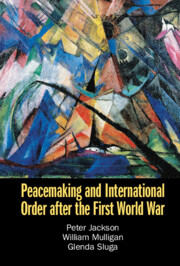Book contents
- Peacemaking and International Order after the First World War
- Peacemaking and International Order after the First World War
- Copyright page
- Contents
- Contributors
- Acknowledgements
- 1 Introduction
- Part I Ordering Concepts
- 2 Vocabularies of Self-Determination in 1919
- 3 Recasting the ‘Fabric of Civilisation’
- 4 State Sovereignty
- 5 The Crisis of Power Politics
- 6 The Challenge of an Absent Peace in the French and British Empires after 1919
- Part II Institutions
- Part III Actors and Networks
- Part IV Counterpoint
- Index
6 - The Challenge of an Absent Peace in the French and British Empires after 1919
from Part I - Ordering Concepts
Published online by Cambridge University Press: 18 May 2023
- Peacemaking and International Order after the First World War
- Peacemaking and International Order after the First World War
- Copyright page
- Contents
- Contributors
- Acknowledgements
- 1 Introduction
- Part I Ordering Concepts
- 2 Vocabularies of Self-Determination in 1919
- 3 Recasting the ‘Fabric of Civilisation’
- 4 State Sovereignty
- 5 The Crisis of Power Politics
- 6 The Challenge of an Absent Peace in the French and British Empires after 1919
- Part II Institutions
- Part III Actors and Networks
- Part IV Counterpoint
- Index
Summary
This chapter begins from the proposition that there was neither peace settlement, nor order, nor peace in the British and French empires after 1919. It focuses on those regions where British and French imperial territories and new imperial claims rubbed against one another with greatest friction. With typical acuity, historian John Mackenzie has warned against what he terms ‘the space station approach’ to the analysis of interwar imperialism. Viewed from a great distance, the First World War ‘becomes a sort of hinge or lever that articulates the events of the decades that went before and also those that came afterwards’. Mackenzie’s insight offers a starting point for this chapter’s analysis, which warns against regarding decolonisation deterministically, written as much in the failure of peacemaking as in the intensification of international rivalries in the 1930s. It thus draws the British and French empires back from their historical precipice, restoring a sense of contingency and according due importance to the short-term imperial expansions of the 1920s and the persistence of everyday violence and colonial rights abuses despite the new architecture of supranational oversight emerging from the peace settlement.
- Type
- Chapter
- Information
- Peacemaking and International Order after the First World War , pp. 151 - 176Publisher: Cambridge University PressPrint publication year: 2023

